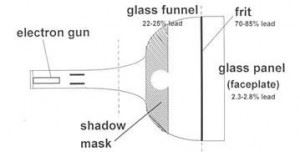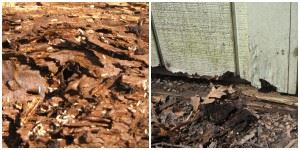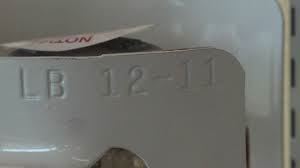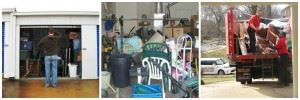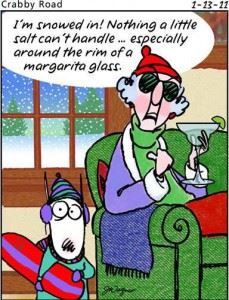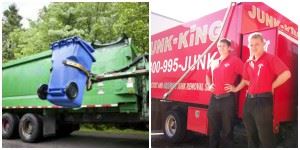Property managers, businesses, and homeowners can quickly discern which junk or debris removal companies are first rate and which ones are risky.
The Washington Metro Area has no fewer than 30 junk hauling companies comprising at least 160 trucks ranging from 20,000 GVW trucks to pick-up trucks. You have a lot of choices; however, junk hauling companies fall into two basic categories: First Rate and Risky. Our rough estimate is that about half the trucks represent First Rate companies and half represent Risky haulers.
When selecting a hauler, you first need to decide whether you want to work with a First Rate or if you are willing to absorb Risk. I’ll tell you up front that you pay a little more or a First Rate hauler—but less of a difference than you’d think. Here is how you distinguish Frist Rate and Risky haulers.
Employees
First Rate haulers, like Junk King, have W-2 employees: vetted and trained. (Junk King Fairfax is veteran-owned and we recruit veterans.) Risky haulers use 1099 labor (independent contractors). Some use day laborers. This practice saves labor expense and shifts the risk of accident away from the hauler and onto the laborer or even the customer.
Insurance and Licenses
First Rate haulers carry all the required insurance. For example, Junk King carries the following insurance:
- Workers Compensation Insurance (each accident $100,000, disease $100,000)
- Auto Insurance (each accident $1,000,000)
- General Liability Insurance (each occurrence $1,000,000, damage to rented premises $100,000, medical expenses per person $10,000, personal injury $1,000,000)
- General aggregate $ 2,000,000
- Products $2,000,000
- Cargo Carrier insurance (each vehicle $50,000)
- For Hire Tags
- DOT Registration and Inspection
Risky haulers who use 1099 independent contractors or day laborer avoid the legal requirement to pay worker’s compensation or unemployment insurance. Risky haulers often skip or are light on General liability. Most are not registered with the Department of Transportation. If something goes seriously wrong, the customer has little recourse but to sue a company with a net worth that amounts to a used truck. Or worse, an uninsured laborer injured on your property may go after your assets.
Capacity
First Rate haulers typically have at least three trucks and crews capable of loading and hauling up to 200 cubic yards per day. You may not need that much capacity, but size does indicate the company’s serious commitment to a long-term business. Junk King has three trucks with a fourth truck arriving in March 2014.
Specialization
The best haulers stick to their specialty— hauling and disposal. Some branch into the business of moving household goods, which is pretty close. Risky haulers will do anything from washing windows to snow removal to landscaping. If the hauler advertises too many services, they are probably not expert at any of them.
Physical Address
First Rate haulers have a real business address. Junk King has a 2,500 square foot warehouse in Lorton where we sort donatables and recyclable debris before disposing the burnable debris at the Covanta plant in Lorton. Because we have a place to store recyclables, we can take many items that other haulers do not take such as propane tanks, tires, cement, and such. Here is a picture of our 2500 square-foot warehouse.
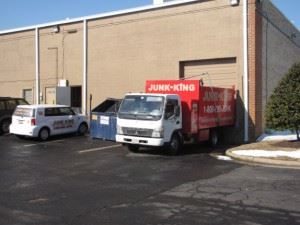
JUnk KIng’s 2500 sqft warehouse for sorting
Risky haulers typically do not have a separate business address—certainly not a warehouse. Typically, they use personal or phony addresses in their websites and listings. For example, we found a typical one-truck hauler posting two addresses in Yelp and the Better Business Bureau. Here are pictures of both addresses—neither is a place to keep a junk hauling truck. Beware of companies that use multiple or phony addresses.
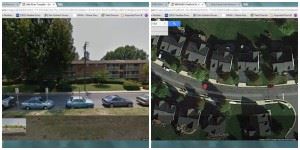
Yelp and BBB addresses for a one-truck hauler–really?
In addition, this same one-truck hauler posts a Burke, VA address and a Wilson Blvd, Arlington address on other websites.
Responsible Disposal
First Rate haulers can achieve a 60% recycling rate just by using the Covanta plant. To meet the Covanta rules, the hauler needs to sort the debris. A warehouse or large outdoor bins are necessary to effectively sort debris. If the hauler fails to sort the debris, Covanta bans them and they must resort to the landfill. Risky haulers who lack the resources to sort debris need the convenience of the landfill. Junk King has the resources and is 100% landfill free. We find sources to take cement, drywall, and other non-burnable debris plus eco-friendly ways to dispose e-waste, tires, metals and such.
Price
Although Risky haulers cut corners on labor, insurance, service, and proper disposal, they don’t give the customer much of a price break. Depending on the size of the job, the cost of using a First Rate hauler like Junk King is typically 2% to 5% more than using the Risky hauler.
Two minutes of research can prevent months of headaches.
You can quickly determine if a hauler is First Rate or Risky with two simple questions:
- Will the crew members who come to my site be W-2 employees?
- What is the business address? (Then search on Google Map.)
If the crews are not W-2 employees, you can be fairly certain the hauler is not paying workers compensation, and you may suspect that other insurance coverage is also missing. If the business address looks suspicious, you should be suspicious.
If you are a realtor, property manager, or other business, you might ask if the hauler will add you as a “co-insured.” This small paper drill costs the First Rate hauler little or nothing and adds protection for the customer.
Conclusion
Prudent business owners and homeowners do their due diligence before bringing a service company onto their property. You have plenty of high quality, service-oriented junk removal services to choose from. Junk King Fairfax is striving to be the best of the best.
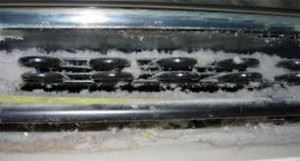
 Text Us
Text Us




